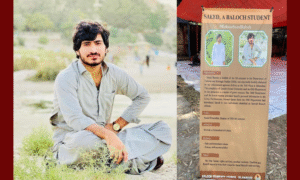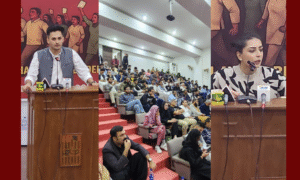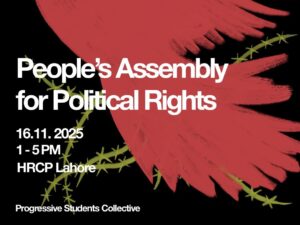Pakistan finds itself in a state of deep turmoil following the highly dramatic arrest of Imran Khan, the Chairman of PTI. This arrest, orchestrated by NAB, an institution with questionable constitutional standing, was established by a military dictator with the intent to deter elected representatives. The case at hand revolves around allegations of money laundering, implicating Chairman Khan and Malik Riaz of the Bahria Group. While delving into the technical intricacies of the case may be burdensome, it is crucial to shed light on the broader implications of the current state of affairs and its impact on the national economy.
Since the arrest, Pakistan has been thrown into a state of chaotic political turmoil, raising concerns about the possibility of a civil war. Similar to recent conflicts in Sudan, where rival generals fought for power, Pakistan faces a different yet equally worrisome situation: a revolution that lacks a clear plan and direction. This instability sets the stage for an unavoidable path towards internal conflict and violence.
Pakistan has long been plagued by tumultuous times, and the current situation is not an isolated incident. The challenges faced by this beleaguered nation trace back to its very inception. It all began with the infamous broken ambulance incident in 1948, and since then, Pakistan has endured the scars of four wars with its eastern neighbor. The division of its eastern part further added to the nation’s woes.
Throughout its history, Pakistan has witnessed the political hanging of populist leader Zulfikar Ali Bhutto and a series of military interventions that curtailed the tenure of democratically elected governments. The economy has remained in a constant state of fragility, and the recurring invocation of Article 58-2(B) has allowed presidents to dismiss elected prime ministers, casting a shadow over hopes for democratic stability.
Khan possesses a charismatic oratory prowess that allows him to deftly manipulate the masses. His emotionally charged phrases, like “Hum koi ghulaam hain? (Are we slaves?)”, “Absolutely NOT!”, have a way of igniting people’s sentiments. Populism thrives on such coaxing and cajolery, tapping into the desires of the people to attain what they want.
The act of arresting a former prime minister has sadly become an all too familiar occurrence, a reflection of the political and moral landscape of our state. However, in the case of Imran Khan, his arrest has sparked widespread and violent protests across the nation. The question arises: Why? Why are citizens taking to the streets for Khan and not for others? The answer lies in the power of populism.
Khan possesses a charismatic oratory prowess that allows him to deftly manipulate the masses. His emotionally charged phrases, like “Hum koi ghulaam hain? (Are we slaves?)”, “Absolutely NOT!”, have a way of igniting people’s sentiments. Populism thrives on such coaxing and cajolery, tapping into the desires of the people to attain what they want.
We have witnessed numerous instances where supporters rally behind populist leaders, only for these protests to descend into chaos. A recent example is the infamous attack on the White House by supporters of the right-wing Republican Trump, turning a demonstration of support into a violent confrontation that resulted in casualties and injuries. Many populist leaders employ similar rhetoric to attract the masses, whether it’s Xi Jinping repeatedly invoking “100 years of humiliation” or Narendra Modi evoking “Akhand Bharat (Undivided India)”.
Politicians utilize these rhetorical strategies to deftly maneuver the minds of their supporters, appealing to their emotions and grievances. The consequences, as we have seen, can be both divisive and destructive. It is a sobering reminder of the potent force that populism wields, and a call for greater understanding and scrutiny of its impact on our society.
True revolution requires more than just the personality cult of a politician; it necessitates a coherent vision and ideology. In the absence of these essential elements, the chaos that ensues can only be seen as fleeting and misguided.
In Pakistan, we witness PTI supporters taking to the streets in an attempt to challenge the prevailing status quo. However, their protests lack a clear ideological foundation. Their sole motivation for rallying is the arrest of their revered leader, The Great Khan (a title reminiscent of the tribal leaders of the Mongols). This arrest is, in part, a consequence of Mr. Khan’s unyielding and inflexible approach, as he shows no inclination to find a middle ground with the current government.
True revolution requires more than just the personality cult of a politician; it necessitates a coherent vision and ideology. In the absence of these essential elements, the chaos that ensues can only be seen as fleeting and misguided.
If one were to inquire about Mr. Khan’s accomplishments during his four years in government, the response would be disheartening: “I was not allowed to administer.” When a politician resorts to such a statement, it signifies a lack of competence to effectively govern the affairs of the state. It is imperative to recognize that sustainable change is not built solely on the charisma of a leader, but on a solid ideological foundation and the ability to navigate complex political landscapes. Only then can true progress and transformation be achieved.
The heart of today’s violent protests lies in the deep-seated frustration felt by the public. In Pakistan, citizens have long been denied their fundamental rights by both military and civilian governments. An economic crisis has further compounded the quandary faced by the people. The echoes of a troubled history, coupled with a lack of voice in governance, the suppression of unions, and the stifling of free speech, have all contributed to the flames of dissent that burn in these ongoing demonstrations.
However, it is important to note that many of the issues mentioned above have also been perpetuated by the PTI government itself, resulting in a clash between factions with fascist tendencies. The act of vandalizing, attacking, and setting public property ablaze does not constitute a revolution, particularly when it stems from a personality cult. True revolutions seek to overturn entire political and economic structures.
Moreover, these ongoing crises are taking a heavy toll on the national exchequer. The value of the dollar has surged, with the Pakistani rupee dropping to 290 PKR to 1 USD today. Additionally, the stock market experienced a significant decline of almost 400 points during the trading session on May 9th, marking a downturn after a period of bullish performance.
Amidst an impending financial meltdown, such acts of turmoil are poised to yield disastrous consequences for the economy.Of particular concern is the delay in the IMF’s disbursement of a much-needed 1 billion USD bailout to aid Pakistan’s economic recovery, despite the nation fulfilling nearly all the lender’s conditions. Presently, Pakistan’s foreign exchange reserves stand at a meager 4 million USD, enough to cover only three to four weeks of imports. This dire situation is exacerbated by inflation reaching its highest level in the past six decades. Urgent measures are required to address these pressing economic challenges and safeguard the nation’s financial stability
Recent days have exposed deep divisions within our apex court, with clear factions emerging among our judges. This partisan approach has only heightened the already tense political and constitutional climate. The infighting among our institutions does not bode well for Pakistan’s future. Both the establishment and the judiciary must urgently realign themselves within their constitutional boundaries in order to ensure a smoother functioning of our democratic system. It is imperative that they prioritize the nation’s interests over any personal or partisan agendas.
In order to bring about meaningful progress, politicians must set aside their warring attitudes and work together cohesively for the betterment of the state. The consequences of continued discord among political leaders will only lead to further exasperation for the nation. In a democratic country, genuine and sincere dialogue should always be the ultimate recourse.
It is crucial to uphold the principles of democracy and allow the citizens of Pakistan the freedom to choose their leaders, who will responsibly govern the affairs of the country. To move forward, Pakistan requires a renewed social order and a fresh social contract that ensures political and individual liberties for all members of society, without any discrimination.
In the face of this ongoing and distressing scenario, it is essential that we do not lose heart. Instead, we must assert that the prevailing status quo and the pervasive class conflicts will one day diminish through the transformative power of the ultimate revolution. Let us prepare the ground for that final struggle against class conflict; expose the capitalist system and organise among the working class, peasantry, students, and all marginalised identities. Until then, let us find solace and inspiration in the beautiful verses penned by comrade Faiz A. Faiz.
ہم دیکھیں گے
لازم ہے کہ ہم بھی دیکھیں گے
وہ دن کہ جس کا وعدہ ہے
جو لوح ازل میں لکھا ہے
ہم دیکھیں گے
جب ظلم و ستم کے کوہ گراں
روئی کی طرح اڑ جائیں گے
ہم محکوموں کے پاؤں تلے
جب دھرتی دھڑ دھڑ دھڑکے گی
اور اہل حکم کے سر اوپر
جب بجلی کڑ کڑ کڑکے گی
ہم دیکھیں گے
جب ارض خدا کے کعبے سے
سب بت اٹھوائے جائیں گے
ہم اہل صفا مردود حرم
مسند پہ بٹھائے جائیں گے
سب تاج اچھالے جائیں گے
سب تخت گرائے جائیں گے
ہم دیکھیں گے
بس نام رہے گا اللہ کا
جو غائب بھی ہے حاضر بھی
جو منظر بھی ہے ناظر بھی
اٹھے گا انا الحق کا نعرہ
جو میں بھی ہوں اور تم بھی ہو
اور راج کرے گی خلق خدا
جو میں بھی ہوں اور تم بھی ہو
Rehan is a student of law at PULC.




